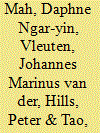|
|
|
Sort Order |
|
|
|
Items / Page
|
|
|
|
|
|
|
| Srl | Item |
| 1 |
ID:
115647


|
|
|
|
|
| Publication |
2012.
|
| Summary/Abstract |
Consumers have a major role to play in smart grid technologies which can be instrumental in addressing climate change and energy challenges. However, little is known about how consumers perceive, and how they might respond to the opportunities that smart grid technologies offer. This paper reports the results from a Hong Kong survey (n=505). It contributes to the literature by providing a better understanding of the perceptions and behaviour of electricity consumers about the possible deployment of smart grids.
Our results indicate that Hong Kong consumers generally welcomed smart grid technologies and had a preference for energy saving, energy efficiency and renewable energy while they showed a high level of opposition to nuclear power. They displayed an interest in playing a much more informed and active role in energy decision-making, but they were sensitive to tariff increases. Motivations and barriers for consumers to support smart grid developments are also discussed. We conclude with a discussion of policy implications for effective consumer engagement. More policy attention is needed on demand-side measures, introducing institutional and regulatory changes, and modifying relationships between consumers, the government and utilities.
|
|
|
|
|
|
|
|
|
|
|
|
|
|
|
|
| 2 |
ID:
113424


|
|
|
|
|
| Publication |
2012.
|
| Summary/Abstract |
This paper examines the motivations, processes and outcomes of the development of smart grids in South Korea through the perspectives of governance and innovation systems. Drawing on desktop research and semi-structured interviews, this paper has two major findings. First, the development of smart grids in Korea has been shaped by various factors including macroeconomic policy, the role of the government, and experimentation. The complex interactions between these factors at the landscape, regime and niche levels has impacted on the development of smart grids. Second, while Korea's government-led approach has its strengths in driving change, it has also exposed weaknesses in the country's ability to mobilise the private sector and consumer participation. Major obstacles including partial electricity market reform and public distrust exist. A systemic perspective is needed for policy in order to accommodate the changes required for smart grid development. Regulatory reforms, particularly price-setting mechanisms, and consumer engagement are priority areas for policy change.
|
|
|
|
|
|
|
|
|
|
|
|
|
|
|
|
| 3 |
ID:
180170


|
|
|
|
|
| Summary/Abstract |
Effectiveness of renewable energy feed-in tariff (FiT) varies across the world. Designing policy mixes of a package of policy instruments to optimise the normative effect of FiT is critical but has remained challenging and under-studied. This paper brings together the key concepts of policy mixes and policy learning to examine how the effectiveness of renewable energy policies can be improved, with reference to a recent FiT policy in Hong Kong focusing two prospective solar communities. Based on 99 in-depth interviews and workshop discussions involving 57 householders, we found that FiT was an effective policy in stimulating growth of new solar photovoltaic (PV) projects in some sub-sectors in Hong Kong, but has not yet mainstreamed solar at the community and city levels. The FiT was insufficient to address multiple non-economic barriers perceived by householders. The limited policy impacts of the FiT indicated that policy makers were able to attain technical learning, but faced major constraints in advancing to conceptual and social forms of policy learning. This paper concludes that policy makers should give closer attention to policy mixes and advanced forms of policy learning than choosing a single “most effective” policy instrument to unlock the under-used community solar potentials.
|
|
|
|
|
|
|
|
|
|
|
|
|
|
|
|
| 4 |
ID:
126554


|
|
|
|
|
| Publication |
2013.
|
| Summary/Abstract |
Smart grids represent one of the most significant evolutionary changes in energy management systems as they enable decentralised energy systems, the use of large-scale renewable energy as well as major improvements in demand-side-management. Japan is one of the pioneers in smart grid deployment. The Japanese model is characterised by a government-led, community-oriented, and business-driven approach with the launch of four large-scale smart-community demonstration projects. Our case study of large smart grid demonstration projects in Japan found that the Japanese government has demonstrated its high governing capacity in terms of leadership, recombinative capacity, institutional capacity, enabling capacity, and inducement capacity. However, the major limitations of the government in introducing some critical regulatory changes have constrained the smart grid deployment from advancing to a higher-order form of smart grid developments. This paper calls for more attention to be given to the importance of regulatory changes that are essential to overcome the technological lock-in, and the complementary roles of non-state actors such as the business sector and consumers to strengthen the governing capacity of the state.
|
|
|
|
|
|
|
|
|
|
|
|
|
|
|
|
|
|
|
|
|